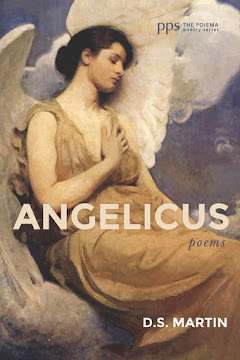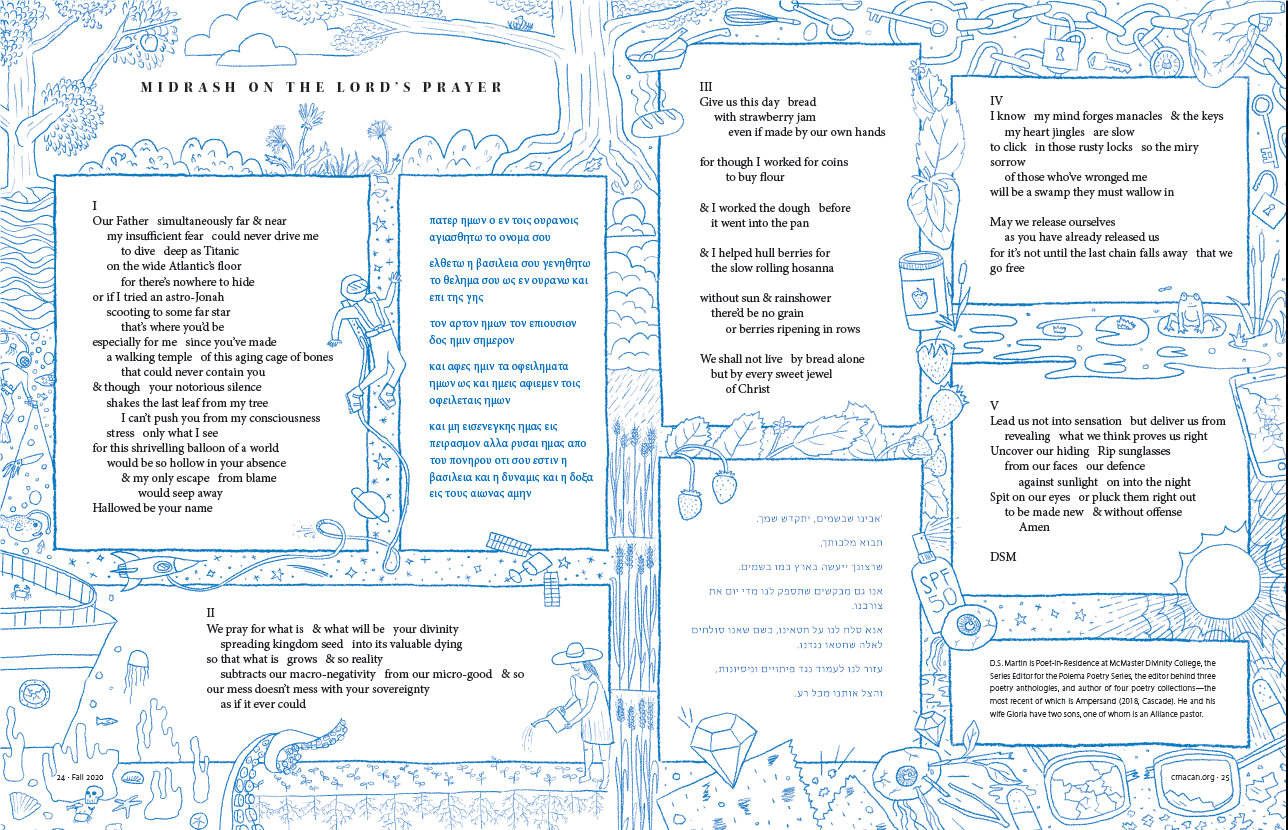G.C. Waldrep was born in Virginia, and is Associate Professor of English at Bucknell University in Pennsylvania. He directs the Bucknell Seminar for Younger Poets. He has five collections of poetry, from Goldbeater's Skin (2003) which was selected by Donald Revell for the Colorado Prize for Poetry, to Testament (2015) which consists of a single, long poem. He is the editor of West Branch, and is Editor-at-large for the Kenyon Review.
He is a member of the Old Order River Brethren, a conservative group who developed along the Susquehanna River, having branched away from the Mennonites. The following poem is from his first poetry collection.
Palinode: Cotton Mather
Praying Always. But in the literal sense?
In the bath? Under the dull breath
of any given second, like his particular faiths?
—Exemplary mutterer, moving through days
with his great mind always fluttering
in the dark cave of his mouth, his manic concern.
He meant well, we might say, and late in life
gave up the constant patter, the need
to bring the world into being, moment by moment,
himself. Watching thereunto with all perseverance
and supplication for all saints. Fair enough:
he persevered, maintained the mission of his public id,
and his supplications, if unheeded, were at least
archived in the libraries of New England.
When I lived in Boston I liked to walk
down past the Common to where the cherries bloomed
in their plots of grass and scored slate,
product of a more decorous generation
though perhaps less prescient: all that careful
horticulture, prayers of hope and terror trembling
on the lips of the women as they left the tomb.
They mistook Christ for the gardener.
As for Mather, his ashes have long been reabsorbed
into the city he helped fix upon said hill.
What he would have wanted? Probably not:
a hard man, though supple in his genuflection
to the order nature brings; this would have been
his Sodom. Now with spring in the air
I lean once more against the oak bench and bargain
what's left of my own heart for mercy on the tongue,
that darkling zeal, those exclamations.
Posted with permission of the poet.
Entry written by D.S. Martin. His latest poetry collection, Conspiracy of Light: Poems Inspired by the Legacy of C.S. Lewis, is available from Wipf & Stock as is his earlier award-winning collection, Poiema.
Monday, June 26, 2017
Monday, June 19, 2017
Elizabeth Jennings*
Elizabeth Jennings (1926—2001) is an Oxford poet, often associated with "The Movement" but always independent in her poetry. She was influenced by Herbert and Hopkins, remaining consistent in her tone without becoming repetitious.
Hester Jones wrote in The Church Times, "Like [her contemporary, Sylvia] Plath, Jennings suffered from mental illness in her adult life, but, as a Roman Catholic, she drew on the tradition of the 'dark night' of St John of the Cross to explore this suffering within the context of faith. Consequently, much of her poetry is marked by moments that contain both momentary glimpses of God's love and the experience of darkness, guilt, and God's absence."
She is one of the poets featured in my new anthology The Turning Aside: The Kingdom Poets Book of Contemporary Christian Poetry — (available here) and through Amazon.
Her Collected Poems 1953-1985 — which she had ruthlessly edited down to 213 pages of the "work she wishes to preserve" — received the W.H. Smith Literary Award. In 2001 she received an honorary Doctor of Divinity from Durham University.
The Lord's Prayer
"Give us this day." Give us this day and night.
Give us the bread, the sky. Give us the power
To bend and not be broken by your light.
And let us soothe and sway like the new flower
Which closes, opens to the night, the day,
Which stretches up and rides upon a power
More than its own, whose freedom is the play
Of light, for whom the earth and air are bread.
Give us the shorter night, the longer day.
In thirty years so many words were spread,
And miracles. An undefeated death
Has passed as Easter passed, but those words said
Finger our doubt and run along our breath.
*This is the third Kingdom Poets post about Elizabeth Jennings: first post, second post
Entry written by D.S. Martin. His latest poetry collection, Conspiracy of Light: Poems Inspired by the Legacy of C.S. Lewis, is available from Wipf & Stock as is his earlier award-winning collection, Poiema.
Hester Jones wrote in The Church Times, "Like [her contemporary, Sylvia] Plath, Jennings suffered from mental illness in her adult life, but, as a Roman Catholic, she drew on the tradition of the 'dark night' of St John of the Cross to explore this suffering within the context of faith. Consequently, much of her poetry is marked by moments that contain both momentary glimpses of God's love and the experience of darkness, guilt, and God's absence."
She is one of the poets featured in my new anthology The Turning Aside: The Kingdom Poets Book of Contemporary Christian Poetry — (available here) and through Amazon.
Her Collected Poems 1953-1985 — which she had ruthlessly edited down to 213 pages of the "work she wishes to preserve" — received the W.H. Smith Literary Award. In 2001 she received an honorary Doctor of Divinity from Durham University.
The Lord's Prayer
"Give us this day." Give us this day and night.
Give us the bread, the sky. Give us the power
To bend and not be broken by your light.
And let us soothe and sway like the new flower
Which closes, opens to the night, the day,
Which stretches up and rides upon a power
More than its own, whose freedom is the play
Of light, for whom the earth and air are bread.
Give us the shorter night, the longer day.
In thirty years so many words were spread,
And miracles. An undefeated death
Has passed as Easter passed, but those words said
Finger our doubt and run along our breath.
*This is the third Kingdom Poets post about Elizabeth Jennings: first post, second post
Entry written by D.S. Martin. His latest poetry collection, Conspiracy of Light: Poems Inspired by the Legacy of C.S. Lewis, is available from Wipf & Stock as is his earlier award-winning collection, Poiema.
Monday, June 12, 2017
Marin Sorescu
Marin Sorescu (1936—1996) is a Romanian poet, playwright and prose writer. In 1964 the Romanian government began to relax its censorship rules, which led to a resurgence of literature in that country. Sorescu became one of the leading figures.
His 1968 play Iona (Jonah) takes the Biblical story and expands it to imaginatively include a tale of what went on inside the whale's belly. It played to packed theatres in Bucharest, until it was withdrawn because of its controversial content.
The following poem (translated by Adam J. Sorkin and Linda Vianu) was written in the Cochin Hospital, Paris in October of 1996 — and the second, two months later, just three days before Sorescu's death. They both appear in The Bridge.
Lord!
Lord,
Take me by the hand
And let's go! Together we'll run away
From this world!
Let's duck out for some air.
Maybe with a change of scene,
I'll feel more in my element
By Your side.
A Turn For The Better
It's good, O Lord,
That You thought of me
And didn't choose somebody else
For Your delicate, frightful
Experiment.
I knew I could stand up to the worst
And I boasted
That deep inside I had
Inexhaustible energy.
I fell into the sin of pride.
Forgive me,
It's human —
Avert Your glance likewise
From my other sins.
I believe that the life granted me
Really was mine,
That I really was myself,
Perhaps sometimes forgetting You.
Now, beginning to take a turn for the better,
Or so those who see me say,
I must be treading on Your coattails of rainbow,
To the totality of my fright,
I've come to add the precious stone of humility,
And I bring to the Creator of light
My praise of magnificence and glory.
This post was suggested by my friend Burl Horniachek.
Entry written by D.S. Martin. His latest poetry collection, Conspiracy of Light: Poems Inspired by the Legacy of C.S. Lewis, is available from Wipf & Stock as is his earlier award-winning collection, Poiema.
His 1968 play Iona (Jonah) takes the Biblical story and expands it to imaginatively include a tale of what went on inside the whale's belly. It played to packed theatres in Bucharest, until it was withdrawn because of its controversial content.
The following poem (translated by Adam J. Sorkin and Linda Vianu) was written in the Cochin Hospital, Paris in October of 1996 — and the second, two months later, just three days before Sorescu's death. They both appear in The Bridge.
Lord!
Lord,
Take me by the hand
And let's go! Together we'll run away
From this world!
Let's duck out for some air.
Maybe with a change of scene,
I'll feel more in my element
By Your side.
A Turn For The Better
It's good, O Lord,
That You thought of me
And didn't choose somebody else
For Your delicate, frightful
Experiment.
I knew I could stand up to the worst
And I boasted
That deep inside I had
Inexhaustible energy.
I fell into the sin of pride.
Forgive me,
It's human —
Avert Your glance likewise
From my other sins.
I believe that the life granted me
Really was mine,
That I really was myself,
Perhaps sometimes forgetting You.
Now, beginning to take a turn for the better,
Or so those who see me say,
I must be treading on Your coattails of rainbow,
To the totality of my fright,
I've come to add the precious stone of humility,
And I bring to the Creator of light
My praise of magnificence and glory.
This post was suggested by my friend Burl Horniachek.
Entry written by D.S. Martin. His latest poetry collection, Conspiracy of Light: Poems Inspired by the Legacy of C.S. Lewis, is available from Wipf & Stock as is his earlier award-winning collection, Poiema.
Monday, June 5, 2017
Brian Doyle
Brian Doyle (1956—2017) is a Catholic novelist, essayist and poet, having published 28 works, and been nominated nine times for the Oregon Book Award — eventually winning for his novel Martin Marten (2016), which also won the Leslie Bradshaw Award for Young Adult Literature, and the Banff Mountain Book Award for Fiction. He died on May 27th from complications related to a brain tumor.
In 1991 he became editor of the University of Portland's Portland Magazine, a role he served well in for the remainder of his life. His most-recent poetry collection How The Light Gets In (2015, Orbis Books) — whose title comes from a Leonard Cohen song — is described as a collection of prose poems, since Doyle's style is quite conversational, and unconcerned with meter or other maters of poetic musicality.
The following poem first appeared in The Christian Century.
Mrs. Job
There was a man in the land of Uz, whose name was Job;
And he was essentially a blameless dude, and unarrogant,
And he was blessed with seven sons, and three daughters,
Which is a lot of children, and where, I ask politely, is the
Part of the Book of Job where we talk about Job’s spouse,
Who is conspicuously not discussed in the back and forth
With his buddies and then suddenly the Big Guy Himself
Answering out of the whirlwind and commanding old Job
To gird up his loins, which loins were undeniably vigorous
Previous to the Lord interrupting Job, and after the Maker
Finishes one of the greatest eloquent scoldings of all time,
He grants old Job another seven sons and three daughters,
Again without the slightest thanks for the astounding Mrs.
Job who suddenly has twenty count them twenty children
With no mention of her humor, or the vast hills of diapers,
Or her wit which survived kids throwing up and the sheep
Wandering off, and plagues of locusts and things like that.
A good editor, I feel, would have asked for just a glancing
Nod to the wry hero of the tale, at least acknowledgment;
Something like a new last line after So Job died, being old
and full of days, which might read, And also passed a most
Amazing woman, of whom nothing other than the blessing
Was ever said, her heart being a gift beyond calculation by
Man, her mind sharp, her tongue gentle, her hands a mercy,
And her very presence full reason to kneel in prayer at that
Which the Lord in His mercy has made and granted briefly.
A line like that would only hint at her, but it’s a start, right?
Entry written by D.S. Martin. His latest poetry collection, Conspiracy of Light: Poems Inspired by the Legacy of C.S. Lewis, is available from Wipf & Stock as is his earlier award-winning collection, Poiema.
In 1991 he became editor of the University of Portland's Portland Magazine, a role he served well in for the remainder of his life. His most-recent poetry collection How The Light Gets In (2015, Orbis Books) — whose title comes from a Leonard Cohen song — is described as a collection of prose poems, since Doyle's style is quite conversational, and unconcerned with meter or other maters of poetic musicality.
The following poem first appeared in The Christian Century.
Mrs. Job
There was a man in the land of Uz, whose name was Job;
And he was essentially a blameless dude, and unarrogant,
And he was blessed with seven sons, and three daughters,
Which is a lot of children, and where, I ask politely, is the
Part of the Book of Job where we talk about Job’s spouse,
Who is conspicuously not discussed in the back and forth
With his buddies and then suddenly the Big Guy Himself
Answering out of the whirlwind and commanding old Job
To gird up his loins, which loins were undeniably vigorous
Previous to the Lord interrupting Job, and after the Maker
Finishes one of the greatest eloquent scoldings of all time,
He grants old Job another seven sons and three daughters,
Again without the slightest thanks for the astounding Mrs.
Job who suddenly has twenty count them twenty children
With no mention of her humor, or the vast hills of diapers,
Or her wit which survived kids throwing up and the sheep
Wandering off, and plagues of locusts and things like that.
A good editor, I feel, would have asked for just a glancing
Nod to the wry hero of the tale, at least acknowledgment;
Something like a new last line after So Job died, being old
and full of days, which might read, And also passed a most
Amazing woman, of whom nothing other than the blessing
Was ever said, her heart being a gift beyond calculation by
Man, her mind sharp, her tongue gentle, her hands a mercy,
And her very presence full reason to kneel in prayer at that
Which the Lord in His mercy has made and granted briefly.
A line like that would only hint at her, but it’s a start, right?
Entry written by D.S. Martin. His latest poetry collection, Conspiracy of Light: Poems Inspired by the Legacy of C.S. Lewis, is available from Wipf & Stock as is his earlier award-winning collection, Poiema.
Subscribe to:
Posts (Atom)






















